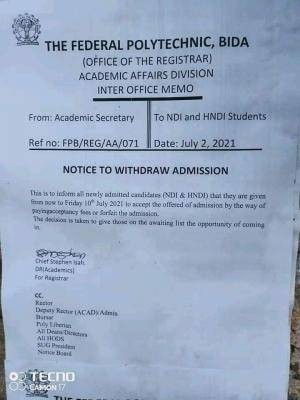
Guidance counsellors are essential part of the education system. But their contributions hardly receive the required recognition in Nigeria, writes GBENGA ADENIJI
Fourteen years ago, Bolajoko Smith needed someone to adequately guide him on the course to fill in his University Matriculation Examination form (now Unified Tertiary Matriculation Examination). Being the first child of his parents with a younger brother who was just preparing to enter secondary school, he was left with either asking his parents for guidance or those already in tertiary institutions.
His parents suggested law whereas he studied sciences. Smith met a relative who was then studying mechanical engineering at the Federal University of Technology, Owerri, Imo State.
He said, ‘‘He advised me to choose Building when I told him I like designing and working on building projects. I did as he advised. I was lucky to be admitted but after a year, I discovered that it was not a course I liked. I eventually wrote another UME without abandoning the programme. I chose civil engineering, filled the University of Ilorin and was admitted. I thank God that today I am an engineer and I enjoy what I do. I do not blame the relative because he only advised me within his capacity.’’
Smith was lucky because many students who found themselves in his situation have not been able to overcome it so easily. Some are studying courses that they chose without proper counseling while others opted for some courses because their friends were studying them.
Like Smith, the situation of such students would have been addressed from the foundation if they had encountered professional counsellors.
A counsellor in the Counselling Unit, University of Lagos, Mrs. Uchenna Okonkwo, said the importance of school counsellors cannot be over-emphasised.
She added that trained counsellors give advice to pupils or students to meet their needs. According to her, they are important not only to schools but also to the society and families.
Okonkwo said, ‘‘As far as life is concerned, there will always be a cross to carry. Counsellors see things in troubled individuals which other people cannot see because they are not trained in that area. That is why counsellors are capable of advising and guiding. One cannot just call upon anybody to counsel one. When students come to our office, they feel lighter when leaving than when they came. We talk to them based on our experience and as professionals. We are trained in the areas of human system and how it works.
Some students are bothered by what is happening in their homes and it affects them when they get to school. They may not be able to confide in anyone but they will willingly tell a counsellor. We counsel on career, health, leadership, relationship, cultism, among others.’’
Noting that some stages of growth in children require parents’ attention, she added that it would be risky to force courses on students without being part of the developmental stages from inception.
“There are certain stages in the development of a child which parents should part be of. They need to know what a child is doing at a certain stage. From ages 1-3, 3-5, 5-7, 7-10, 10-15, 15-18 and 18 and above, parents should be there at each of the stages to fill in what is necessary. It will be dangerous for any parent to abandon a child and just tell such child at stage 15-18 that there is a particular course he wants him or her to study. It will not work that way because the child must have imbibed some things before then which the parent is unaware of. We try to do our best in this regard because we act as parents to the students,’’ she said.
A postgraduate student of the Department of Counselling Psychology, Faculty of Education, University of Benin, Mrs. Omolara Akanni, said she was not aware of the role of counsellors until she enrolled for the course.
She said what she learnt in the course had opened her eyes to the contributions of counsellors in the lives of the youth and teenagers.
Akanni added, ‘‘If counsellors are celebrated and recognised in secondary schools and in other places they are needed, we will have better youths that will make better parents and a better society. But counsellors are not well recognised in Nigeria. I decided to study counselling psychology because of what I suffered due to lack of good career guidance when I was in the secondary school.’’
She urged all primary and secondary schools to have guidance counsellors who would tackle wrong career choices, teenage pregnancy, drug abuse, juvenile delinquency and other social vices confronting youths.
Akanni, who also said counsellors could mediate in conflicts in homes, added that she would not hesitate to allow any of her children to study guidance and counselling or psychology if they wish to.
However, a Lagos-based teacher, Mrs. Oluwakemi Oguntoye, said she would not encourage her children to study the course.
She argued that graduates of guidance and counseling often find it difficult to secure employment because many don’t see the course as lucrative.
Oguntoye also said most private schools don’t employ counsellors despite the importance of their work in building a total man.
“I will not encourage my children to study the course because many of the graduates work only in schools and churches. It is not easy to get a job in Nigeria and it is not wise to study a course that the society sees as not lucrative. From my experience, some private school owners believe that teachers should be able to counsel pupils or students instead of employing trained counsellors,’’ she said.
Also, a student of the Department of Educational Psychology and Counselling, Faculty of Education, Ahmadu Bello University, Zaria, Miss. Oyinlola Fadairo, said she was not sure if she would practice with her degree after graduation.
She noted that she would first experiment with teaching and later weigh the options of working as a counsellor.
Fadairo said, ‘‘Many school owners are yet to understand the worth of counsellors. Two of my friends once told me the meagre salary they were offered by the proprietress of a private secondary school who accepted their applications. It is even worrisome that counsellors are seen more in universities and some secondary schools whereas they are very essential in primary schools because that is the foundation.”
A lecturer in the Department of Psychology, Obafemi Awolowo University, Ile-Ife, Prof. Oluwatoba Elegbeleye, said it was vital for guidance counsellors to be part of the component of the school system.
He however lamented that it was not so because people try to bend rules and cut corners in Nigeria. ‘‘In a situation where a guidance counsellor is not available in a school, there will problems in counseling both at the career and personal levels.”
In 2010 during the round-table talks on the newly introduced Senior Secondary School Education Curriculum, delegates from colleges of education in the country called for more awareness on guidance and counselling in order for National Certificate of Education teachers in primary and secondary schools to effectively counsel their pupils and students.
The situation does not seem to have improved despite the fact that there is a provision for guidance and counseling in Nigeria’s National Policy on Education.


